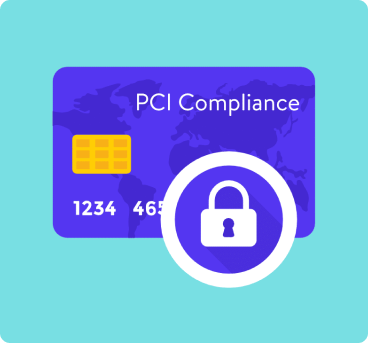PCI Compliance Consultant

PCI Compliance Services
Protect Payment Data | Mitigate Risks | Ensure Long-Term Security
In today’s digital landscape, securing payment data is not just a regulatory requirement—it’s a business necessity. At Data Collaboration Services (DCS), our PCI compliance services provide organizations with the tools and expertise required to achieve and maintain compliance with the Payment Card Industry Data Security Standard (PCI DSS). We simplify the process, protect sensitive cardholder data, and minimize the risk of costly breaches.
Don’t leave your business vulnerable to costly data breaches. Partner with DCS – a trusted PCI compliance service provider – and ensure your payment systems remain secure, compliant, and future-proof.
Why PCI Compliance is Essential
Our PCI Compliance Consultant services safeguard businesses that handle credit card transactions, ensuring that cardholder data is securely stored, processed, and transmitted. Failing to meet PCI standards can expose businesses to fines, reputational damage, and data breaches.
Avoid Financial Penalties
Non-compliance can result in fines ranging from $5,000 to $100,000 per month.
Enhance Customer Trust
Demonstrating secure payment practices improves credibility and customer loyalty.
Prevent Data Breaches
Robust security measures mitigate vulnerabilities and protect sensitive payment information.
Meet Legal Requirements
Compliance aligns with industry standards and complements regulations such as GDPR.
Our PCI Compliance Services
DCS delivers comprehensive PCI compliance consulting services designed to meet the unique needs of your business, regardless of size or complexity.
- In-depth analysis of current infrastructure, policies, and procedures.
- Identification of vulnerabilities and compliance gaps.
- Customized roadmap to achieve PCI DSS certification.
- Hands-on support to address vulnerabilities and implement required security controls.
- Encryption, network segmentation, and firewall setup.
- Application of best practices to minimize PCI scope.
- Continuous compliance monitoring and management.
- Regular audits, vulnerability scans, and penetration testing.
- Real-time reporting and rapid response to emerging threats.
- Secure storage, transmission, and processing of payment data.
- Implementation of tokenization and point-to-point encryption (P2PE).
- Multi-factor authentication (MFA) and access control measures.
- Development of security policies and procedures aligned with PCI DSS.
- Staff training on PCI requirements, phishing prevention, and data handling.
- Ongoing education to maintain compliance year-round.
All Services
Quick Contact
Simplify PCI Compliance
Ensure seamless compliance with tailored strategies.

PCI Compliance Consulting Services Tailored to Your Industry
We understand the diverse needs of different industries and offer customized PCI compliance services for:
- Retail & eCommerce – Securing online transactions and POS systems.
- Healthcare – Ensuring HIPAA and PCI DSS alignment for patient payment data.
- Financial Services – Strengthening data security in line with PCI and SOX regulations.
- Hospitality – Safeguarding guest payment information across booking platforms.
- Education – Securing tuition and donation payment systems.
With our Compliance-as-a-Service, you receive dedicated resources that continuously manage and optimize your compliance processes. This proactive approach not only reduces the risk of non-compliance but also minimizes downtime, allowing your IT team to focus on core operations.

Our PCI Compliance Services
DCS delivers comprehensive PCI compliance consulting services designed to meet the unique needs of your business, regardless of size or complexity.

Scoping and Discovery
- Identify cardholder data environments (CDE) and define PCI scope.
- Map data flows and network architecture.
Vulnerability Assessment
- Conduct penetration testing, external and internal scans.
- Address vulnerabilities through remediation and network hardening.
Implementation of Controls
- Deploy encryption, firewalls, and secure configurations.
- Implement strong access control and authentication policies.
Validation and Certification
- Perform final audits and submit Reports on Compliance (ROC).
- Assist with Self-Assessment Questionnaires (SAQ) and Attestation of Compliance (AOC).
Ongoing Maintenance
- Regular PCI audits and continuous monitoring of security posture.
- Proactive updates to align with evolving PCI DSS versions and emerging threats.
Key Features of Our PCI Compliance Services
- Custom Security Architecture tailored to your business environment.
- 24/7 Monitoring and Threat Detection for ongoing protection.
- Real-time Reporting Dashboards providing insights into compliance status.
- Comprehensive Support from qualified PCI compliance consultants and security professionals.
The DCS Advantages
Proven Expertise
Certified PCI compliance consultants with years of experience across industries.
Cost-Effective Solutions
Scalable PCI compliance services that align with your budget and requirements.
End-to-End Coverage
From initial assessment to continuous monitoring and maintenance.
Client-Centric Approach
Customized PCI compliance solutions designed to reduce PCI scope and lower costs.
Frequently Asked Questions (FAQ'S)
Any organization that stores, processes, or transmits cardholder data must comply with PCI DSS. This includes retailers, healthcare providers, service providers, and financial institutions.
Non-compliance can lead to hefty fines, data breaches, reputational damage, and even the revocation of your ability to process card payments.
The timeline varies depending on your current security posture and the complexity of your infrastructure. On average, it can take anywhere from a few weeks to several months.
Yes. Our Compliance-as-a-Service offering ensures continuous monitoring and management, keeping your business compliant year-round.
Costs depend on the size of your organization, the scope of services required, and the complexity of your infrastructure. We provide customized quotes tailored to your needs.
Annual assessments are required to maintain PCI DSS compliance. However, ongoing monitoring and updates are crucial to staying compliant year-round.
Failure to meet PCI DSS standards can lead to fines and increased vulnerability to breaches. We provide remediation services to address compliance issues quickly.
Achieving PCI DSS compliance not only protects your business from cyber threats but also builds customer trust, enhances operational efficiency, and improves your brand’s reputation.
PCI Compliance Consultant Services by DCS
Protect your business and customer data with expert PCI compliance consulting from DCS. With over a decade of experience, we help New York businesses meet PCI DSS requirements efficiently and securely. From assessments to ongoing compliance support, we ensure your systems are secure, your data is protected, and your audits are stress-free.

PCI readiness assessments

Remediation planning

Vulnerability scanning & penetration testing

Policy & procedure development

Secure network architecture

24/7 monitoring & audit support


